| Srl | Item |
| 1 |
ID:
140299
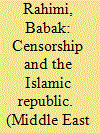

|
|
|
|
|
| Summary/Abstract |
This article focuses on censorship in Iran and offers an overall view on the control of information through complex regulatory and cultural practices that make media production possible under the Islamic Republic. In contrast to conventional views of censorship as simply restricting content, this article defines two types of regulatory measures: reactive and proactive. It is argued that the latter is distinctive since it generates an environment that establishes pervasive control of what individuals or groups may be able to say or do in a public setting.
|
|
|
|
|
|
|
|
|
|
|
|
|
|
|
|
| 2 |
ID:
129693
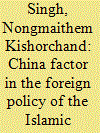

|
|
|
|
|
| Publication |
2014.
|
| Summary/Abstract |
The Islamic Republic of Iran has been the centre of global push and pull because of its geostrategic position and its engagement with other regional and international actors. And the controversy over Iran's foreign policy is as old as the Islamic public itself. The debate over its clandestine nuclear program and dispute with the west continue to dominate world headlines. In order to gain a better understanding of Iran, it is important to analyze its foreign policy through which one can access its position in the regional and international affairs.
|
|
|
|
|
|
|
|
|
|
|
|
|
|
|
|
| 3 |
ID:
098988
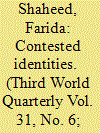

|
|
|
|
|
| Publication |
2010.
|
| Summary/Abstract |
In Pakistan, the self-serving use of Islam by more secular elements alongside politico-religious ones facilitated the latter's increasing influence and the conflation and intricate interweaving of Islam and Pakistani nationhood. A paradigm shift under Zia's martial law revamped society as much as state laws, producing both religiously defined militias and aligned civil society groups. Examining the impact on women of fusing religion and politics, this paper argues that women become symbolic markers of appropriated territory in the pursuit of state power, and that the impact of such fusing, different for differently situated women, needs to be gauged in societal terms as well as in terms of state dynamics. Questioning the positing of civil society as a self-evident progressive desideratum, the paper concludes that gender equality projects seeking reconfigurations of power cannot be effective without vigorously competing in the creation of knowledge, culture and identity.
|
|
|
|
|
|
|
|
|
|
|
|
|
|
|
|
| 4 |
ID:
102864
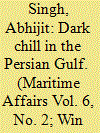

|
|
|
|
|
| Publication |
2010.
|
| Summary/Abstract |
This article reviews the sustained growth of Iran's naval forces in the past two decades. It closely examines the Islamic Republic's navy's war-waging capacity in the Persian Gulf, its new unconventional fighting philosophy, force imperatives, doctrinal underpinnings, combat objectives, and the implications that this might have on shipping and oil trade in the Persian Gulf. Experts have long speculated that Iran is developing its asymmetric capabilities aimed at paralysing the Persian Gulf and the eventual expansion of its sphere of influence. Interfering with the supply of oil would raise oil prices sharply and would certainly stall the still moderate global economic recovery, thereby plunging the world again into a global recession. Analysis shows that the modernisation of its naval forces might be the clearest indication that Iran may well be systematically developing the means to do so. This is brought home starkly by the beefing up of the Revolutionary Guards' Navy and its "swarming" capabilities. With a newfound assertiveness and aggressive tactics, the Iranian naval forces are now challenging the dominant force in the Persian Gulf - the US Navy. And even though the success of such an approach at this stage appears unlikely, they may still hold some key cards, to be able to pose a credible and effective threat.
|
|
|
|
|
|
|
|
|
|
|
|
|
|
|
|
| 5 |
ID:
114706


|
|
|
|
|
| Publication |
2012.
|
| Summary/Abstract |
As Iran continues its pursuit of a nuclear capability, outside observers have debated just how worried the world should be. Optimists argue that since nuclear war would be suicidal, no government would ever risk it, and they think the Islamic Republic would be no exception. Pessimists argue that Iran's radical and unstable regime might behave in unpredictable ways and cannot be trusted. Both camps seem to agree that rationality is the key to deterrence; they disagree over whether a nuclear Iran would be rational.
|
|
|
|
|
|
|
|
|
|
|
|
|
|
|
|
| 6 |
ID:
153379


|
|
|
| 7 |
ID:
105630


|
|
|
|
|
| Publication |
2011.
|
| Summary/Abstract |
The foreign policy of the Islamic Republic of Iran is widely misunderstood. On the one hand many experts regard the Iranian foreign policy as being essentially ideology driven while on the other hand a significant body of opinion believes that ideology is a convenient smokescreen for Iran's pursuit of its national interests. This paper examines the role of ideological, political and institutional actors in the context of the Islamic Republic's quest for consensus and cohesion. The purpose is to delve into the relationship between these factors with a view to understanding how this complex interaction impacts on foreign policy formulation and implementation. It is proposed that any improvement to the current system requires a more transparent strategic direction.
|
|
|
|
|
|
|
|
|
|
|
|
|
|
|
|
| 8 |
ID:
142149


|
|
|
|
|
| Summary/Abstract |
The latest political realignment in the Islamic Republic resulted in détente with the West even as regional upheaval has drawn Tehran into overextended military interventions. While Iran’s future is uncertain, it is definitely not a hegemon in the making.
|
|
|
|
|
|
|
|
|
|
|
|
|
|
|
|
| 9 |
ID:
124236
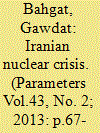

|
|
|
|
|
| Publication |
2013.
|
| Summary/Abstract |
Iran's nuclear program has become the major dispute between the Islamic Republic and global powers, led by the United States. This essay identifies the principal elements in any potential agreement, and outlines the steps needed to enhance the opportunity for a successful negotiation. Rapprochement between Tehran and Washington is not only possible, but indeed, desirable.
|
|
|
|
|
|
|
|
|
|
|
|
|
|
|
|
| 10 |
ID:
108364
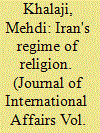

|
|
|
| 11 |
ID:
133623
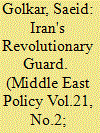

|
|
|
|
|
| Publication |
2014.
|
| Summary/Abstract |
During the past three decades, numerous Western media sources have portrayed Iranians as opposed to the United States, epitomized by a small group shouting "death to America." However, many Westerners who have traveled to Iran have seen a completely different picture, often finding that many Iranians have more positive attitudes.1 Many American visitors have described Iranians as the most pro-American people in the Middle East.2 Deep frustration with the Islamic Republic and mistrust of the clerical establishment's propaganda have made Iranians "avid fans of America: its culture, films, food, music, it's open, free-wheeling society
|
|
|
|
|
|
|
|
|
|
|
|
|
|
|
|
| 12 |
ID:
137842


|
|
|
|
|
| Summary/Abstract |
For decades, Iran has supported the regime of Bashar al-Asad in Syria with military advisors, weapons, and both diplomatic and financial support due to Tehran's belief that a pro-Iranian government in Syria is a core national interest. In this regard, cooperation with Damascus has provided Tehran with a number of strategic advantages, which it is loath to surrender. More recently, the Iranians have also come to view Syria as a vital ally against the threat of the Islamic State in Iraq and al-Sham (ISIS). In this environment, the Islamic Republic will likely continue to bolster the Asad regime even if the Syrian civil war continues for years.
|
|
|
|
|
|
|
|
|
|
|
|
|
|
|
|
| 13 |
ID:
093450


|
|
|
| 14 |
ID:
098891
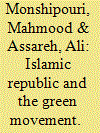

|
|
|
|
|
| Publication |
2009.
|
| Summary/Abstract |
Dr. Monshipouri is an associate professor of international relations at San Francisco state University. He is the author, most recently, of Muslims in global politics: Identites, interests and human rights.Mr. Assareh is specializing in international law at New York University School of Law.
|
|
|
|
|
|
|
|
|
|
|
|
|
|
|
|
| 15 |
ID:
145331


|
|
|
| 16 |
ID:
183245
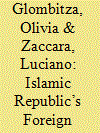

|
|
|
|
|
| Summary/Abstract |
Despite the often perceived rigidity of its ideology and inflammatory rhetoric, Iran’s foreign policy is inherently pragmatic while nonetheless moving within the institutionalised frame of its revolutionary discourse. An alternative perspective on the Islamic Republic’s and Persian Gulf relations is offered by analysing Iran’s discursive and practical initiatives of constructive engagement with the Gulf Cooperation Council (GCC) countries during Hassan Rouhani’s presidency through the Iranian lens. This includes strategies of discursive persuasion and initiatives such as “World Against Violence and Extremism” (WAVE) as well as the “Hormuz Peace Endeavor” (HOPE), both aimed at building confidence and improving Iran’s legitimacy in the region.
|
|
|
|
|
|
|
|
|
|
|
|
|
|
|
|
| 17 |
ID:
107057
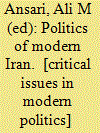

|
|
|
|
|
| Publication |
London, Routledge, 2011.
|
| Description |
4 vol. set.; xxiii, 302p.
|
| Series |
Critical issues in modern politics
|
| Contents |
Vol. I: History and historiography
Vol. II: Politics
Vol. III: Economy and Society
Vol. IV: International Relations
|
| Standard Number |
9780415409117
|
|
|
|
|
|
|
|
|
|
|
|
Copies: C:4/I:0,R:4,Q:0
Circulation
| Accession# | Call# | Current Location | Status | Policy | Location |
| 056203 | 320.955/ANS 056203 | Main | On Shelf | Reference books | |
| 056204 | 320.955/ANS 056204 | Main | On Shelf | Reference books | |
| 056205 | 320.955/ANS 056205 | Main | On Shelf | Reference books | |
| 056206 | 320.955/ANS 056206 | Main | On Shelf | Reference books | |
|
|
|
|
| 18 |
ID:
139136
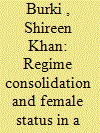

|
|
|
|
|
| Summary/Abstract |
The Iranian Revolution, through Khomeini's consolidation measures, quickly morphed into an ‘Islamic Revolution’. Khomeini's regime abrogated popular legislation such as the Family Protection Laws of 1967 and 1975, which protected the rights of females, as the clerics sought to institute Shariah (Islamic) laws in an ‘Islamic Republic’. The historical record reveals that the precipitous legal transformation from secular to Shariah law under Ayatollah Khomeini's personal tutelage placed females in a dangerous predicament. Regressive gender policies, however, served to mobilize females to push back against the new social paradigm which had emerged under the rubric of Velayat-e-Fiqh. This article examines this misogynistic trajectory during Khomeini's rule and how it served to galvanize many Iranian women to ‘gender activism’.
|
|
|
|
|
|
|
|
|
|
|
|
|
|
|
|
| 19 |
ID:
093573
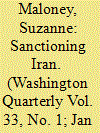

|
|
|
| 20 |
ID:
109894
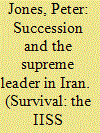

|
|
|